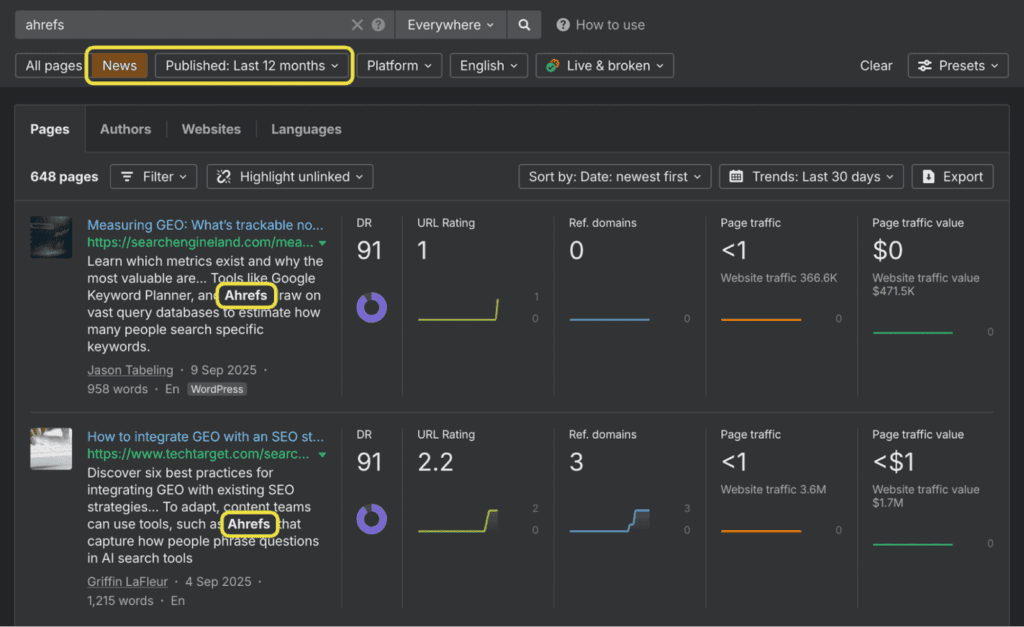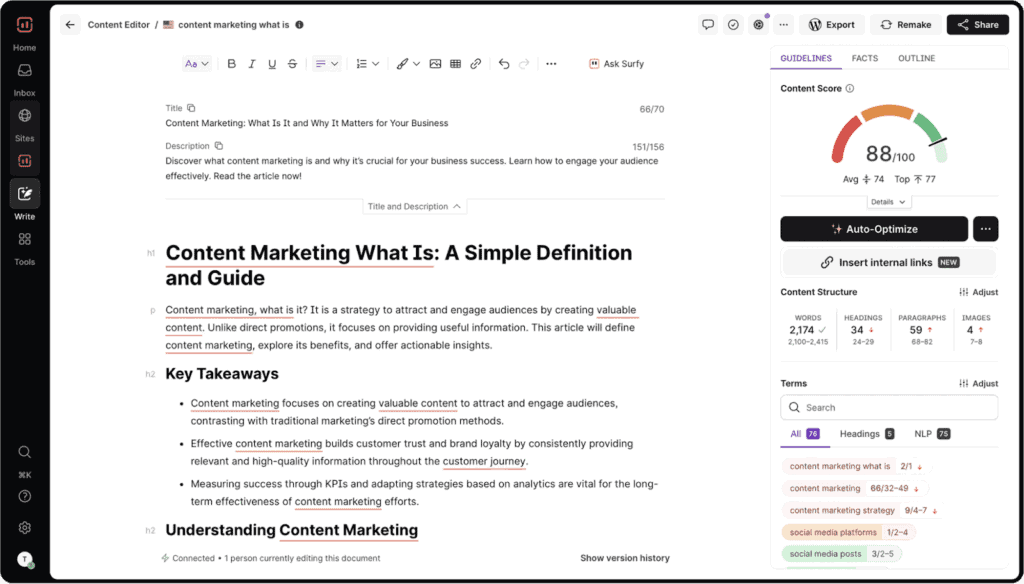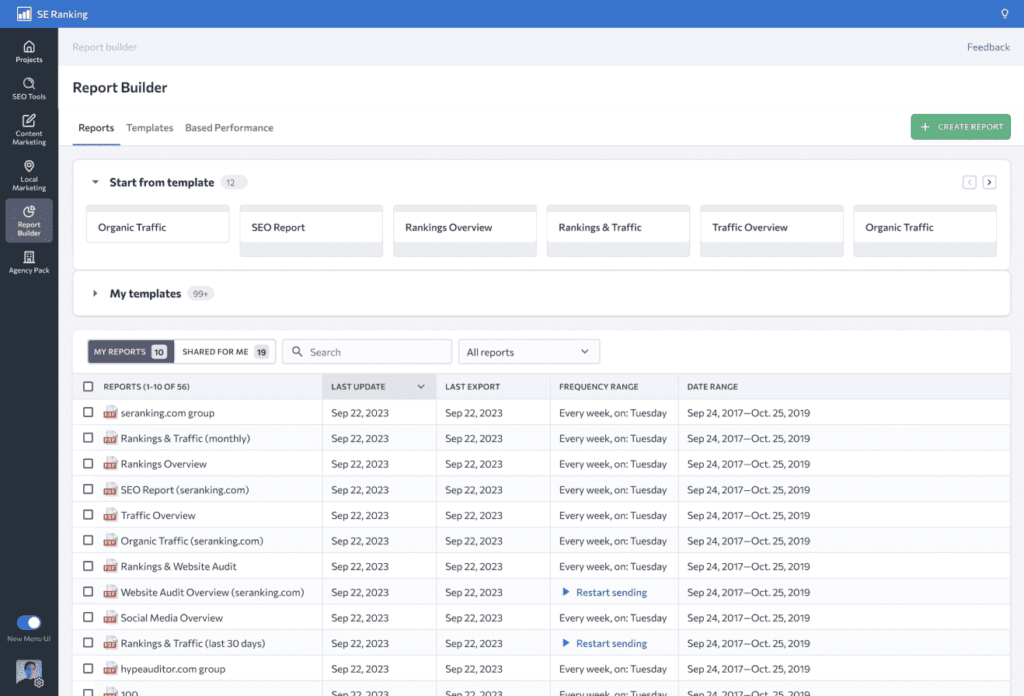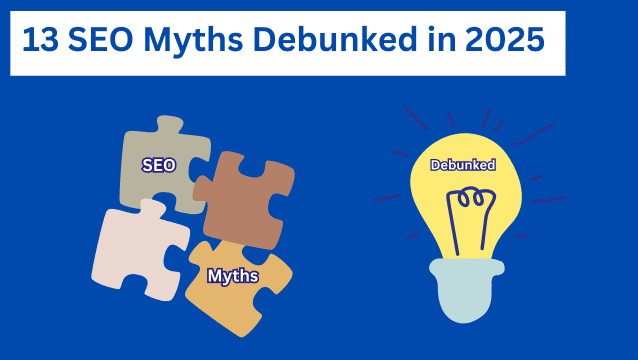Picking the right top SEO tools can feel overwhelming. There are hundreds of options out there, and each one promises results. The truth is, using the right tools can save you time, improve your strategy, and boost your visibility in search.
In this guide, we’ll review nine SEO tools. We’ll also discuss how to evaluate them and which ones are worth including in your stack. By the end, you’ll know where to invest for real results.
Highlights
- Learn what top SEO tools are and how they support strategies like keyword research and link building.
- Understand how to evaluate tools based on usability and reporting features.
- Explore nine popular platforms trusted by professionals.
- See how these tools cover technical SEO, competitor analysis, and rank tracking.
What are SEO tools?
SEO tools are platforms that help you improve how your website performs in search engines. They give you the data and insights you need to build smarter strategies, fix issues, and grow your reach online.
These tools can support many popular SEO strategies. These include broken link building, influencer collaborations, and guest posting.
Many tools like Ahrefs and SEMrush already cover keyword research, competitor insights, and reporting in one place. This means that you don’t have to use multiple tools to improve your search visibility and outrank competitors.
How to evaluate SEO tools for your stack
Before investing in any platform, it’s essential to know what to look for and how to verify its reliability. Here are some features to consider.
- Range of use cases. Decide if you need features like on-page SEO. Or broader coverage like rank tracking, backlink research, or content strategy.
- Integrations. Make sure the tool connects easily with Google Ads, WordPress, or Google Search Console. This helps streamline your workflow.
- Usability and support. A steep learning curve or poor support can stop your team from using the tool effectively.
- Reporting options. Features such as white-labeling and automated reporting are essential for agencies and teams that share data with stakeholders.
Metrics and third-party proof
Credibility matters. Always validate a tool by checking it against trusted benchmarks. For example, you can use a Backlink Checker or a domain authority tool to confirm whether the data looks accurate.
A good platform should also provide you with clear metrics, like keyword difficulty, visibility score, and rank tracking. Avoid tools that hide behind vague measures or inflated numbers.
It’s also smart to look beyond the vendor’s own marketing. Independent reviews, customer case studies, and third-party comparisons provide more objective proof of quality.
Check whether the tool is being updated to reflect modern SEO challenges, such as AI Summaries or UX audits. A platform that doesn’t evolve with search will quickly become outdated.
The 9 top SEO tools your stack should consider
SEO continues to grow. In a 2025 State of SEO Survey by Conductor, 91% of marketers said SEO improved their website performance and helped hit marketing goals.
The key is picking the right tools. Some specialize in SERP analysis and others in content strategy or technical SEO.
Let’s look at the top SEO tools that can make a real difference in your SEO team.
1. Ahrefs
Ahrefs is one of the most popular SEO tools on the market. It’s known for its backlink index and accurate keyword data, which makes it a favorite among professionals.
The Site Explorer provides a clear view of which websites link to you or your competitors. This helps you identify content gaps and discover related keywords worth targeting.
Ahrefs’ Keywords Explorer offers detailed insights into keyword difficulty, search demand, and click-through potential.
For link building, the backlink analysis feature shows both the quality and quantity of links. This makes it easier to find opportunities and monitor your backlink profile.
The Content Explorer adds another layer. You can search for top-performing pages across the web. This is a great way to get inspiration for your content strategies and surface fresh content ideas.

Ahrefs also includes a Rank Tracker. This allows you to track keyword positions over time and compare them with those of your competitors. At the same time, you can use the platform’s SEO reports to share performance results with teams or clients.
Best for: Marketers and agencies that want deep backlink data, accurate competitor analysis, and reliable keyword insights in one platform.
2. SEMrush
SEMrush is another all-in-one platform. It covers a lot of SEO areas. These include keyword tracking, SERP analysis, and content marketing campaigns.
Its content audit feature helps you review pages across your site and highlights opportunities for content optimization. This makes it easier to refine pages that aren’t performing well and spot content gaps that competitors are ranking for.
SEMrush also has a competitor analysis tool called the Traffic & Market Toolkit. It allows you to view traffic sources, backlinks, and your competitors’ ad strategies.

Despite the fact that SEMrush is particularly expensive, many agencies still rely on it. The tool combines SEO, paid search, and reporting features in one platform.
For example, companies can use the platform’s white-label reporting features that they can share with their clients to build long-term trust.
Best for: Enterprises or agencies with bigger budgets. So it’s ideal if you’re managing both organic and paid search data for multiple clients.
3. Surfer SEO
Surfer SEO compares your draft directly to top-ranking pages in search engine results pages (SERPs). And it shows you what your content is missing.
It tells you which SEO keyphrases you should include. It also guides you on how to structure your article for improved visibility.
One of Surfer’s popular features is its real-time optimization. As you write or edit, Surfer gives instant feedback on keyword usage, headings, and word count. It identifies opportunities to update older articles to align with current search trends and search intent.

For strategists, Surfer’s SERP-based analysis can be helpful because it doesn’t just suggest terms. It explains why competitors are ranking. And what you need to add or refine to compete.
Best for: Content writers and editors who want data-backed guidance to create SEO-friendly articles that rank in search engines.
4. Screaming Frog SEO Spider
The Screaming Frog SEO Spider Website Crawler is a must if you’re serious about technical SEO.
It acts like a search engine crawler. It scans your entire website to identify any issues that could be hurting your rankings.
This SEO tool shows you how search engines view your pages. This is important for maintaining a healthy and crawlable site.
It highlights broken links, duplicate content, and missing metadata. These are all part of technical SEO.

Screaming Frog is especially popular with teams that need to run large-scale website audits. It can handle thousands of URLs in a single crawl. And export the data for further analysis.
Best for: Technical SEO professionals, developers, and digital teams who need to maintain healthy websites, improve UX audits, and fix technical barriers to search visibility.
5. Moz Pro / Moz Link Explorer
Moz is another top SEO tool we’ve included in this guide. It’s known for its link building features and clear SEO reports.
Many marketers still turn to Moz for its user-friendly interface and community resources, which make learning SEO easier.
One of its standout tools is Moz Link Explorer. This provides detailed backlink research features to help you understand your own link profile. The keyword research tool analyzes keyword difficulty, monthly volume, and organic click-through rates.

Agencies often choose Moz for its reputation management features that help brands track mentions and sentiment across the web.
Best for: Teams seeking a well-established platform with a robust community, intuitive tools, and reliable metrics for link building and keyword research.
6. SE Ranking
SE Ranking has built a reputation as an affordable yet feature-rich platform. It’s often chosen by teams that want the capabilities of bigger platforms without the steep price tag.
If you’re using SE Ranking, you may benefit from the AI Rank Tracker. This feature helps predict changes and spot opportunities early. You can also use it as a content audit tool to get a quick overview of your site’s health.
Another feature this SEO tool offers is the SEO Report Generator. This produces reports with automated options that save time for busy marketers. The platform also includes custom dashboards that allow you to monitor performance metrics, such as visibility score, making it easy to communicate progress to clients or internal stakeholders.

What makes SE Ranking especially interesting is its balance of functionality and cost. It’s not overloaded with unnecessary features. However, it still provides the essentials for competitor analysis, on-page SEO, and long-term strategy development.
Best for: Small to mid-sized businesses and agencies that want reliable tools without the high cost of premium all-in-one platforms.
7. Clearscope
Clearscope has become a favorite among content teams, as it makes the content creation process more strategic. It shows you exactly what topics and terms you should include to compete with top-ranking pages.
Clearscope analyzes related keywords and search trends. This ensures your draft aligns with both what users want and what search engines expect.
The platform generates detailed reports. These grade your content based on coverage and search intent. This provides writers with a clear roadmap, making it easier to craft pieces that thoroughly answer search queries.

Clearscope also integrates directly with Google Docs and WordPress. This means it offers real-time feedback as you write. You don’t have to wait until after publishing to know if your article is optimized.
Best for: Writers, editors, and strategists who want data-driven briefs and real-time optimization guidance to create content that both readers and search engines will love.
8. BuzzSumo
BuzzSumo is built for content discovery and social insights. This makes it a strong choice for marketers who want to connect SEO performance with audience engagement.
It doesn’t focus solely on keywords or backlinks. It helps you identify which topics are generating buzz across the web and what people are actually sharing.
The platform highlights trending topics across multiple platforms. It also shows which articles, videos, or posts perform best in terms of interactions and engagement. You receive alerts for brand mentions, competitor activity, or keywords you want to track. This means you can respond quickly to new opportunities.
Another valuable feature is its influencer research tool. This helps you identify creators and thought leaders who can amplify your content through outreach or collaborations.

For example, you might use BuzzSumo to find content ideas that are trending in your industry. From there, you can map those ideas into SEO-friendly blog posts to capture both search and social audiences.
Best for: Marketers and content teams who want to link SEO efforts with social performance and create content that drives both visibility and engagement.
9. Yoast SEO
Yoast is the most widely used WordPress plugin for on-page SEO. It makes optimization simple and accessible without requiring coding knowledge. With Yoast, you can improve titles, meta descriptions, and structured data directly inside your WordPress dashboard.
The plugin goes beyond basics. It includes schema generator plugins that help search engines understand your content and tools for internal linking suggestions to improve site structure.
It offers readability checks to ensure your writing is easy to read for both users and algorithms. These readability checks even align with natural language processing models, giving you guidance on clarity and flow.

For small businesses and bloggers, Yoast also offers guidance through a traffic light system — red, orange, or green that shows how well a page is optimized. This instant feedback makes it easier to fix issues before publishing.
Best for: Bloggers, small businesses, and WordPress site owners who want to handle their on-page SEO strategies without needing technical expertise.
Get started with the top SEO tools today
The right top SEO tools can give your business the visibility it deserves. But knowing how to use them strategically is what drives real growth.
That’s where we come in. Our team helps you cut through the noise, pick the tools that match your goals, and turn data into measurable results.Ready to take the next step? Book a call with us today and see how we can use the best SEO tools to grow your traffic, rankings, and ROI.


